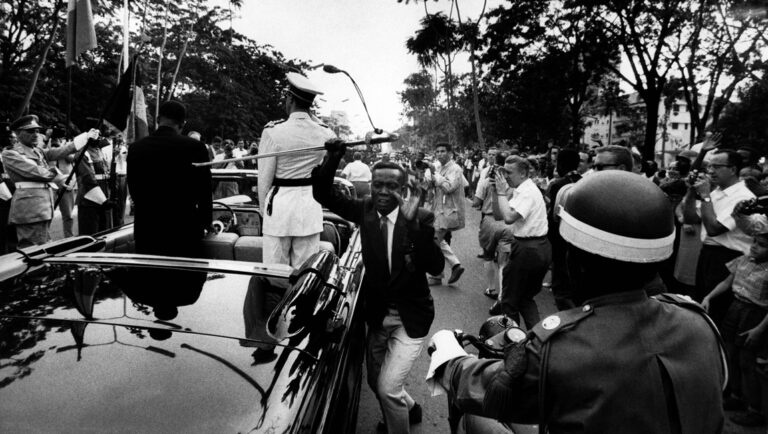Soundtrack to a Coup d’État is as ambitious an archival documentary as its name would suggest, examining the ways in which American bebop and swing jazz traditions intersected with the efforts of the United Nations (led by Belgium and the U.S.) to destabilize the Congo. Director Johan Grimonprez’s argument that musicians such as Dizzy Gillespie, Louis Armstrong, and Nina Simone were used as state assets in the Cold War seems hard to argue against, considering the archival news clippings proclaiming that “pro-American music [from] the 10-ounce turntable can help win the Cold War.” The film is specifically concerned with the assassination of Patrice Lumumba, the Democratic Republic of the Congo’s first prime minister, and the story of the coup against him is viewed principally through the battle between the Soviet Union and the U.S. To this end, Nikita Khrushchev plays a large role in Soundtrack, positioned as an unfairly maligned figure who was attempting to secure the rights of the Afro-Asian bloc coming out of the imperial age.
Grimonprez’s arguments are here simple, though the way his film presents its accounts is anything but — weaving between different continuities and international actors with something akin to the seeming improvisation of its soundtrack. The timeline is mostly confined to the months leading up to the Congo’s independence and the short tenure of Lumumba thereafter, though its jumps to the present vis-à-vis commercials for Tesla and Apple products, and its final act serves to remind the audience that the exploitation of the Congo is an ongoing project. The bulk and form of the film is built on three texts — My Country Africa, Congo Inc., To Katanga and Back, as well as Khrushchev’s audio memoirs. Though narration is used with some frequency, much of the commentary of the film appears as textual passages from these works, often paired with short jazz interludes. The film’s connection to the music of the time also runs through its use as a tool of political espionage, such as Nina Simone being tricked into traveling with a CIA front or Louis Armstrong’s tours around the world to promote the empire. The film’s pop-art sensibilities lend the work an undeniable energy grounded in the era, though the popness can be admittedly jarring in the context of the film’s content.
But what’s ultimately clear is that Grimonprez has constructed a well-studied pop architecture of colonialism’s ravages, and a compelling case against the institutions of Western power that claim to have the best interests of the world at hand. Soundtrack to a Coup d’État does have the occasional tonal misstep, and the inconsistent and sporadic placements of modern commercials feels particularly gauche, but it’s all easily forgivable when considering the enormity of the task at hand and how fundamentally brilliant its essential conception is.
DIRECTOR: Johan Grimonprez; DISTRIBUTOR: Kino Lorber; IN THEATERS: November 1; RUNTIME: 2 hr. 30 min.


Comments are closed.